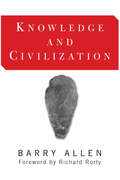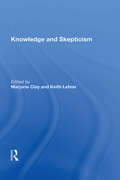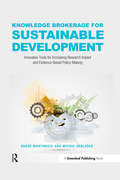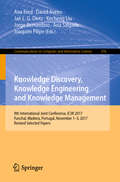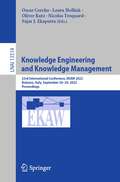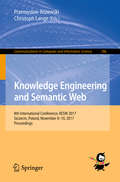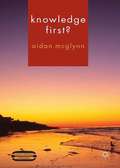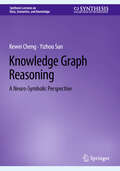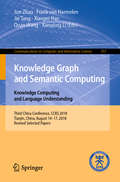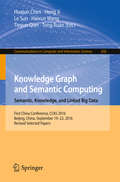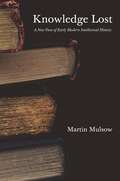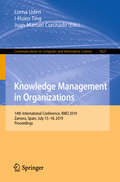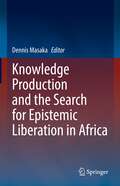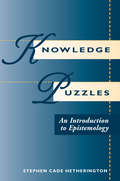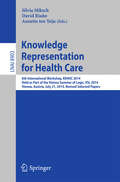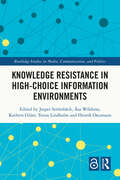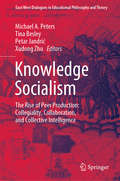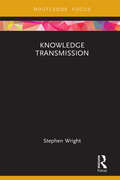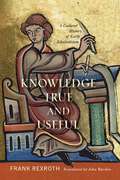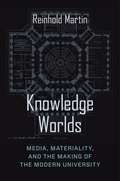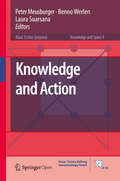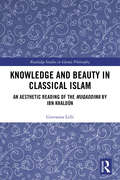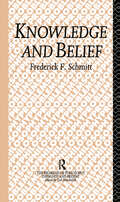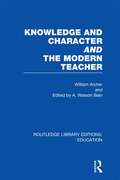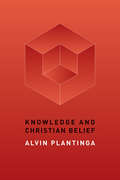- Table View
- List View
Knowledge And Civilization
by Barry AllenOffers a new, original way of framing questions about knowledge. Knowledge and Civilization advances detailed criticism of philosophy's usual approach to knowledge and describes a redirection, away from textbook problems of epistemology, toward an ecological philosophy of technology and civilization. Rejecting theories that confine knowledge to language or discourse, Allen situates knowledge in the greater field of artifacts, technical performance, and human evolution. His wide ranging considerations draw on ideas from evolutionary biology, archaeology, anthropology, and the history of cities, art, and technology.
Knowledge And Skepticism
by Keith Lehrer Marjorie ClayThis book presents the characteristic of philosophical writing in the theory of knowledge covering the major themes: skepticism, externalism, reliabilism, probability, and justification. It also analyses epistemology from both historical and contemporary perspective.
Knowledge Brokerage for Sustainable Development: Innovative Tools for Increasing Research Impact and Evidence-Based Policy-Making
by André Martinuzzi Michal SedlackoThe menace of a post-truth era challenges conventional policy-making and science. Instead of fighting an uphill battle against populist solutions, those involved in both policy-making and science have to find innovative ways to collaborate, and make use of the vast amounts of knowledge that are already available. Knowledge brokerage, in this context, is more than a simple question-and-answer game: it is a process of co-creating and re-framing knowledge. In addition, Knowledge Brokerage for Sustainable Development has to deal with trade-offs and ambiguities, as well as world-views, cultures and the preferences of stakeholder groups. This book is the first in-depth exploration of how knowledge brokerage has the potential to help manage the challenges of sustainable development across political and scientific systems. It presents a selection of innovative and practical tools to enhance the connectivity of research and policy-making on sustainable development issues. In doing so, this book will be an essential publication in research and policy-making. It supports networking among the developers and users of knowledge brokerage systems and will make their experience better known to the different communities involved.The book presents interviews with leading policymakers and researchers such as former EU Commissioner Franz Fischler, Robert-Jan Smits (Director-General of Research and Innovation at the EC), Uwe Schneidewind (President of the Wuppertal Institute), and Leida Rijnhout (European Environmental Bureau). It also provides insights into eleven EU funded projects dealing with different approaches of Knowledge Brokerage for Sustainable Development.
Knowledge Discovery, Knowledge Engineering and Knowledge Management: 9th International Joint Conference, IC3K 2017, Funchal, Madeira, Portugal, November 1-3, 2017, Revised Selected Papers (Communications in Computer and Information Science #976)
by David Aveiro Joaquim Filipe Kecheng Liu Ana Fred Jorge Bernardino Jan L. Dietz Ana SalgadoThis book constitutes the thoroughly refereed proceedings of the 8th International Joint Conference on Knowledge Discovery, Knowledge Engineering and Knowledge Management, IC3K 2017, held in Funchal, Madeira, Portugal, in November 2017.The 19 full papers presented were carefully reviewed and selected from 157 submissions. The papers are organized in topical sections on knowledge discovery and information retrieval; knowledge engineering and ontology development; and knowledge management and information sharing.
Knowledge Engineering and Knowledge Management: 23rd International Conference, EKAW 2022, Bolzano, Italy, September 26–29, 2022, Proceedings (Lecture Notes in Computer Science #13514)
by Oscar Corcho Laura Hollink Oliver Kutz Nicolas Troquard Fajar J. EkaputraThis book constitutes the refereed proceedings of the 23rd International Conference on Knowledge Engineering and Knowledge Management, EKAW 2022, held in Bolzano, Italy, in September 2022. The 11 full papers presented together with 5 short papers were carefully reviewed and selected from 57 submissions The previous event in the series, EKAW 2020, introduced a special theme related to “Ethical and Trustworthy Knowledge Engineering.” This theme is still very relevant in 2022, and thus has remained one of the core topics of the conference.The conference concerned with all aspects about eliciting, acquiring, modeling and managing knowledge, and the construction of knowledge-intensive systems and services for the semantic web, knowledge management, e-business, natural language processing, intelligent information integration, and much more.
Knowledge Engineering and Semantic Web: 8th International Conference, KESW 2017, Szczecin, Poland, November 8-10, 2017, Proceedings (Communications in Computer and Information Science #786)
by Przemysław Różewski and Christoph LangeThis book constitutes the refereed proceedings of the 8th International Conference on Knowledge Engineering and the Semantic Web, KESW 2017, held Szczecin, Poland, in November 2017. The 16 full papers presented were carefully reviewed and selected from 58 submissions. The papers are organized in topical sections on natural language processing; knowledge representation and reasoning; ontologies and controlled vocabularies; scalable data access and storage solutions; semantic Web and education; linked data; semantic technologies in manufacturing and business.
Knowledge First?
by Aidan McglynnAccording to a long tradition, questions about the nature of knowledge are to be answered by analyzing it as a species of true belief. In light of the apparent failure of this approach, knowledge first philosophy takes knowledge as the starting point in epistemology. Knowledge First? offers the first overview of this approach.
Knowledge Graph Reasoning: A Neuro-Symbolic Perspective (Synthesis Lectures on Data, Semantics, and Knowledge)
by Yizhou Sun Kewei ChengThis book provides a coherent and unifying view for logic and representation learning to contribute to knowledge graph (KG) reasoning and produce better computational tools for integrating both worlds. To this end, logic and deep neural network models are studied together as integrated models of computation. This book is written for readers who are interested in KG reasoning and the new perspective of neuro-symbolic integration and have prior knowledge to neural networks and deep learning. The authors first provide a preliminary introduction to logic and background knowledge closely related to the surveyed techniques such as the introduction of knowledge graph and ontological schema and the technical foundations of first-order logic learning. Reasoning techniques for knowledge graph completion are presented from three perspectives, including: representation learning-based, logical, and neuro-symbolic integration. The book then explores question answering on KGs with specific focus on multi-hop and complex-logic query answering before outlining work that addresses the rule learning problem. The final chapters highlight foundations on ontological schema and introduce its usage in KG before closing with open research questions and a discussion on the potential directions in the future of the field.
Knowledge Graph and Semantic Computing. Knowledge Computing and Language Understanding: Third China Conference, CCKS 2018, Tianjin, China, August 14–17, 2018, Revised Selected Papers (Communications in Computer and Information Science #957)
by Frank Van Harmelen Quan Wang Jun Zhao Jie Tang Xianpei Han Xianyong LiThis book constitutes the refereed proceedings of the Third China Conference on Knowledge Graph and Semantic Computing, CCKS 2018, held in Tianjin, China, in August 2018.The 27 revised full papers and 2 revised short papers presented were carefully reviewed and selected from 101 submissions. The papers cover wide research fields including the knowledge graph, information extraction, knowledge representation and reasoning, linked data.
Knowledge Graph and Semantic Computing: Semantic, Knowledge, and Linked Big Data
by Huajun Chen Tieyun Qian Haixun Wang Heng Ji Le Sun Tong RuanThis book constitutes the refereed proceedings of the first China Conference on Knowledge Graph and Semantic Computing, CCKS, held in Beijing, China, in September 2016. The 19 revised full papers presented together with 6 shared tasks were carefully reviewed and selected from numerous submissions. The papers are organized in topical sections on knowledge representation and learning; knowledge graph construction and information extraction; linked data and knowledge-based systems; shared tasks.
Knowledge Lost: A New View of Early Modern Intellectual History
by Professor Martin MulsowA compelling alternative account of the history of knowledge from the Renaissance to the EnlightenmentUntil now the history of knowledge has largely been about formal and documented accumulation, concentrating on systems, collections, academies, and institutions. The central narrative has been one of advancement, refinement, and expansion. Martin Mulsow tells a different story. Knowledge can be lost: manuscripts are burned, oral learning dies with its bearers, new ideas are suppressed by censors. Knowledge Lost is a history of efforts, from the Renaissance to the Enlightenment, to counter such loss. It describes how critics of ruling political and religious regimes developed tactics to preserve their views; how they buried their ideas in footnotes and allusions; how they circulated their tracts and treatises in handwritten copies; and how they commissioned younger scholars to spread their writings after death.Filled with exciting stories, Knowledge Lost follows the trail of precarious knowledge through a series of richly detailed episodes. It deals not with the major themes of metaphysics and epistemology, but rather with interpretations of the Bible, Orientalism, and such marginal zones as magic. And it focuses not on the usual major thinkers, but rather on forgotten or half-forgotten members of the &“knowledge underclass,&” such as Pietro della Vecchia, a libertine painter and intellectual; Charles-César Baudelot, an antiquarian and numismatist; and Johann Christoph Wolf, a pastor, Hebrew scholar, and witness to the persecution of heretics.Offering a fascinating new approach to the intellectual history of early modern Europe, Knowledge Lost is also an ambitious attempt to rethink the very concept of knowledge.
Knowledge Management in Organizations: 14th International Conference, KMO 2019, Zamora, Spain, July 15–18, 2019, Proceedings (Communications in Computer and Information Science #1027)
by Lorna Uden I-Hsien Ting Juan Manuel CorchadoThis book contains the refereed proceedings of the 14th International Conference on Knowledge Management in Organizations, KMO 2019, held in Zamora, Spain, in July 2019. The 46 papers accepted for KMO 2018 were selected from 109 submissions and are organized in topical sections on: knowledge management models and analysis; knowledge transfer and learning; knowledge and service innovation; knowledge creation; knowledge and organization; information systems and information science; data mining and intelligent science; social networks and social aspects of KM; big data and IoT; and new trends in IT.
Knowledge Production and the Search for Epistemic Liberation in Africa
by Dennis MasakaThis book shows the importance of knowledge production using requisite terms and frameworks to the broader scheme of epistemic liberation in Africa. The text considers what this veritable direction to knowledge production would mean to other areas of concern in African philosophy such as morality, education and the environment. These contributions are important because the success of decolonising projects in African countries depend upon the methods that underpin envisioned liberative knowledge production in light of Africa’s historical and present condition. This volume appeals to students and researchers working in epistemology and African philosophy.
Knowledge Puzzles: An Introduction To Epistemology
by Stephen Cade HetheringtonDespite the problems students often have with the theory of knowledge, it remains, necessarily, at the core of the philosophical enterprise. As experienced teachers know, teaching epistemology requires a text that is not only clear and accessible, but also capable of successfully motivating the abstract problems that arise.In Knowledge Puzzles, Stephen Hetherington presents an informal survey of epistemology based on the use of puzzles to illuminate problems of knowledge. Each topic is introduced through a puzzle, and readers are invited to work their own ways toward a solution. Hetherington's light and undogmatic style encourages class discussion and independent thought rather than the memorization of book" answers.Covering all of the most important epistemological issues, informed by classical and contemporary literature, and rich in probing questions and suggestions for further readings, Knowledge Puzzles is a pedagogical breakthrough. Whether it is used as a main text or supplement, this lucid and engaging text will be welcomed by both teachers and students.
Knowledge Representation for Health Care
by David Riaño Silvia Miksch Annette Ten TeijeThis book constitutes the refereed proceedings of the 6th International Workshop on Knowledge Representation for Health Care, KR4HC 2014, held as part of the Vienna Summer of Logic, VSL 2014, in Vienna, Austria, in July 2014. The workshop aimed at attracting the interest of novel research and advances contributing in the definition, representation and exploitation of health care knowledge in medical informatics. The 12 revised full research papers and 4 short papers presented in this book were carefully reviewed and selected from 26 submissions.
Knowledge Resistance in High-Choice Information Environments (Routledge Studies in Media, Communication, and Politics)
by Jesper StrömbäckThis book offers a truly interdisciplinary exploration of our patterns of engagement with politics, news, and information in current high-choice information environments. Putting forth the notion that high-choice information environments may contribute to increasing misperceptions and knowledge resistance rather than greater public knowledge, the book offers insights into the processes that influence the supply of misinformation and factors influencing how and why people expose themselves to and process information that may support or contradict their beliefs and attitudes. A team of authors from across a range of disciplines address the phenomena of knowledge resistance and its causes and consequences at the macro- as well as the micro-level. The chapters take a philosophical look at the notion of knowledge resistance, before moving on to discuss issues such as misinformation and fake news, psychological mechanisms such as motivated reasoning in processes of selective exposure and attention, how people respond to evidence and fact-checking, the role of political partisanship, political polarization over factual beliefs, and how knowledge resistance might be counteracted. This book will have a broad appeal to scholars and students interested in knowledge resistance, primarily within philosophy, psychology, media and communication, and political science, as well as journalists and policymakers. The Open Access version of this book, available at www.taylorfrancis.com, has been made available under a Creative Commons Attribution-Non Commercial-No Derivatives 4.0 license.
Knowledge Socialism: The Rise of Peer Production: Collegiality, Collaboration, and Collective Intelligence (East-West Dialogues in Educational Philosophy and Theory)
by Michael A. Peters Xudong Zhu Petar Jandrić Tina BesleyThis is the first collection focusing on knowledge socialism, a particularly apt term used to describe a Chinese socialist mode of production and socialist approach to development and modernity based around the rise of peer production, new forms of collaboration and collective intelligence. Making the case for knowledge socialism, the book is intended for students, teacher, scholars and policy theorists in the field of knowledge economy.
Knowledge Transmission (Routledge Focus on Philosophy)
by Stephen WrightOur knowledge of the world comes from various sources. But it is sometimes said that testimony, unlike other sources, transmits knowledge from one person to another. In this book, Stephen Wright investigates what the transmission of knowledge involves and the role that it should play in our theorising about testimony as a source of knowledge. He argues that the transmission of knowledge should be understood in terms of the more fundamental concept of the transmission of epistemic grounds, and that the claim that testimony transmits knowledge is not only defensible in its own right, but indispensable to an adequate theory of testimony. This makes testimony unlike other epistemic sources.
Knowledge True and Useful: A Cultural History of Early Scholasticism (The Middle Ages Series)
by Frank RexrothA radical shift took place in medieval Europe that still shapes contemporary intellectual life: freeing themselves from the fixed beliefs of the past, scholars began to determine and pursue their own avenues of academic inquiry. In Knowledge True and Useful, Frank Rexroth shows how, beginning in the 1070s, a new kind of knowledge arose in Latin Europe that for the first time could be deemed “scientific.”In the twelfth century, when Peter Abelard proclaimed the primacy of reason in all areas of inquiry (and started an affair with his pupil Heloise), it was a scandal. But he was not the only one who wanted to devote his life to this new enterprise of “scholastic” knowledge. Rexroth explores how the first students and teachers of this movement came together in new groups and schools, examining their intellectual debates and disputes as well as the lifelong connections they forged with one another through the scholastic communities to which they belonged.Rexroth shows how the resulting transformations produced a new understanding of truth and the utility of learning, as well as a new perspective on the intellectual tradition and the division of knowledge into academic disciplines—marking a turning point in European intellectual culture that culminated in the birth of the university and, with it, traditions and forms of academic inquiry that continue to organize the pursuit of knowledge today.
Knowledge Worlds: Media, Materiality, and the Making of the Modern University
by Reinhold MartinWhat do the technical practices, procedures, and systems that have shaped institutions of higher learning in the United States, from the Ivy League and women’s colleges to historically black colleges and land-grant universities, teach us about the production and distribution of knowledge? Addressing media theory, architectural history, and the history of academia, Knowledge Worlds reconceives the university as a media complex comprising a network of infrastructures and operations through which knowledge is made, conveyed, and withheld.Reinhold Martin argues that the material infrastructures of the modern university—the architecture of academic buildings, the configuration of seminar tables, the organization of campus plans—reveal the ways in which knowledge is created and reproduced in different kinds of institutions. He reconstructs changes in aesthetic strategies, pedagogical techniques, and political economy to show how the boundaries that govern higher education have shifted over the past two centuries. From colleges chartered as rights-bearing corporations to research universities conceived as knowledge factories, educating some has always depended upon excluding others. Knowledge Worlds shows how the division of intellectual labor was redrawn as new students entered, expertise circulated, science repurposed old myths, and humanists cultivated new forms of social and intellectual capital. Combining histories of architecture, technology, knowledge, and institutions into a critical media history, Martin traces the uneven movement in the academy from liberal to neoliberal reason.
Knowledge and Action
by Peter Meusburger Laura Suarsana Benno WerlenThis volume explores interdependencies between knowledge, action, and space from different interdisciplinary perspectives. Some of the contributors discuss knowledge as a social construct based on collective action, while others look at knowledge as an individual capacity for action. The chapters contain theoretical frameworks as well as experimental outcomes. Readers will gain insight into key questions such as: How does knowledge function as a prerequisite for action? Why are knowledge gaps growing and not diminishing in a knowledge society? How much knowledge is necessary for action? How do various types of knowledge influence the steps from cognition to action? How do different representations of knowledge shape action? What impact have spatial conditions for the formation of knowledge? What is the relationship between social and geographical space? The contributors consider rationality in social and economic theories as well as in everyday life. Attention is also given to action theoretic approaches and rationality from the viewpoints of psychology, post-structuralism, and human geography, making this an attractive book for students, researchers and academics of various backgrounds. This book is open access under a CC BY 4. 0 license.
Knowledge and Beauty in Classical Islam: An Aesthetic Reading of the Muqaddima by Ibn Khaldūn (Routledge Studies in Islamic Philosophy)
by Giovanna LelliThis volume offers an aesthetic reading of the Muqaddima by Ibn Khaldūn (d. 1406), a text that has been studied up to the present as a work on historiography. It argues that the Muqaddima is also a comprehensive treatise on classical Arab-Islamic culture and provides a picture of classical Arab-Islamic aesthetics in its totality. The theme of the book is the intrinsic connection between beauty and knowledge in the Muqaddima. Whenever Ibn Khaldūn deals with the problem of knowledge and science, he also deals with the problem of sensual beauty as an instrument or an obstacle to attain it. Ibn Khaldūn’s philosophy of history is necessarily also an aesthetics of history. His key-notion of “group feeling”, the physical, ethic and aesthetic virtue of Bedouin societies, is at once the origin of the ascent of centralised States and the cause of their ruin. It represents a tragic contradiction that applies to the history of the Maghreb but then takes a universal value. It reflects a range of other contradictions inherent to the "system" of classical Arab-Islamic aesthetics. These contradictions undermine the aesthetic system of the Muqaddima from within and provide decisive elements for the emergence of modern aesthetics. Offering a comparative approach, the volume is a key resource to scholars and students interested in Arabic and Islamic studies, philosophy, aesthetics and global history.
Knowledge and Belief (Problems of Philosophy)
by Frederick F. SchmittKnowledge, from Plato onwards, has been considered in relation to justified belief. Current debate has centred around the nature of the justification and whether justified belief can be considered an internal or extenal matter. Epistemological internalists argue that the subject must be able to reflect upon a belief to complete the process of justification. The externalists, on the other hand, claim that it is only necessary to consider whether the belief is reliably formed, and argue that the ability to know by reflection is not required for a justified belief. In the historical section of this book the three most important epistemologists, Plato, Descartes and Hume, as well as the ancient epistemologies of the stoics, Academics and Pyrhonians, are considered. In reconsidering the history of epistemology the author is led to argue against hte view that internalism is historically dominant. His critique of internalism is then developed into a sustained argument against many of its forms, and he goes onto defend an externalist, reliabilist epistemology.
Knowledge and Character bound with The Modern Teacher (Routledge Library Editions: Education)
by William ArcherWritten before, but published after The First World War, this volume’s plea for a national system of education which will produce a nation of prosperous, morally fulfilled people able to live at peace with other nations is doubly poignant given the sacrifice of the ‘lost generation’. However, the author also sees the horror of the War as an opportunity to change human destiny through education, an opportunity to abandon the narrow system of education in favour of one which will ‘bring education in touch with life’ and provide Britain with the intellectual and moral efficiency necessary to steer her through the following turbulent years of the twentieth century. Covering the core subjects of the English school curriculum in the early twentieth century the chapters in The Modern Teacher, if somewhat utopian, describe best practice in teaching of the particular subject and suggest possible improvements. One chapter also discusses the importance of the relatively new subject of citizenship, as well as the moral education of pupils.
Knowledge and Christian Belief
by Alvin PlantingaIn his widely praised Warranted Christian Belief (Oxford, 2000) Alvin Plantinga discussed in great depth the question of the rationality, or sensibility, of Christian belief. In this book Plantinga presents the same ideas in a briefer, much more accessible fashion.Recognized worldwide as a leading Christian philosopher, Plantinga probes what exactly is meant by the claim that religious -- and specifically Christian -- belief is irrational and cannot sensibly be held. He argues that the criticisms of such well-known atheists as Richard Dawkins, Daniel Dennett, Sam Harris, and Christopher Hitchens are completely wrong. Finally, Plantinga addresses several potential “defeaters” to Christian belief -- pluralism, science, evil and suffering -- and shows how they fail to successfully defeat rational Christian belief.
